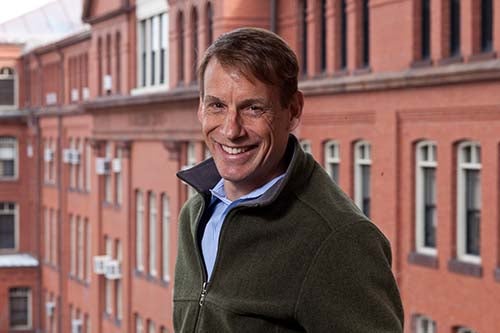Sam Myers AB '87, MPH '07 has always been curious about how our disruption of nature affects human health. Now, as director of the Planetary Health Alliance at Harvard, he helps lead a rapidly growing movement focused on how our degradation of the natural world has become a crucial threat to our existence.
While researching at the Harvard Chan School of Public Health, he dove deep into agricultural journals and discovered something alarming: growing food crops such as potatoes, rice, and wheat in artificial conditions (like greenhouses) with elevated C02 levels causes them to lose the essential nutrients iron and zinc, leading to global nutritional deficiencies.
This led him to explore how other environmental changes caused by human activity impact health—including how declines in pollinators affect global food supply, how warming oceans alter the distribution of fisheries and cause nutrient loss, and how fires from land use in Indonesia led to premature deaths from air pollution. He realized that these urgent issues were all interconnected.
 “Climate is only one of the really important ways we’re disrupting nature,” he says. “Biodiversity loss; the pollution of air, water, and soil; resource scarcity—all these changes to natural systems are happening at the fastest rates in the history of our species and interacting with each other to affect core aspects of human health.”
“Climate is only one of the really important ways we’re disrupting nature,” he says. “Biodiversity loss; the pollution of air, water, and soil; resource scarcity—all these changes to natural systems are happening at the fastest rates in the history of our species and interacting with each other to affect core aspects of human health.”
This realization led him to form the Planetary Health Alliance in 2016. Consisting of 270 organizations in over 57 countries, this academic community trains investigators and clinicians, pursues multilateral policies with business and government leaders, develops communications, and builds the framework of planetary health by translating research into action.
“The challenges that we’re facing are so big, and the pace of change is so fast, that working on these issues project by project isn’t going to get us where we need to go,” says Myers. “The world needs to wake up to the reality that our disruption of natural systems is becoming an urgent threat to our own survival.”
“The series of conversations we’ve been having about particular environmental problems is morphing into one single conversation about social justice and human survival,” he says. “It’s no longer just ‘what’s going to happen to the polar bear’—it’s ‘what’s going to happen to us’”?